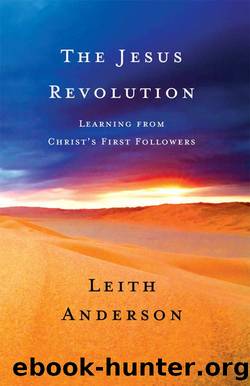The Jesus Revolution: Learning from Christ's First Followers by Leith Anderson

Author:Leith Anderson [Anderson, Leith]
Language: eng
Format: mobi
Tags: Learning from Christ’s First Followers
Publisher: Abingdon Press
Published: 2010-07-31T16:00:00+00:00
Reflect and Discuss
1. Why would God choose Saul for conversion at this point in the history of the church?
2. Can you think of other people—historical or contemporary—who have experienced dramatic conversions? Subtle conversions?
3. Is it difficult to have faith when praying for people in your life who have separated themselves from God? What scriptures give you hope?
Chapter 14
* * *
Imitating Jesus
(ACTS 14:8-20)
Times were tough—even deeply discouraging. James, the brother of John, had been put to death "with the sword" (Acts 12:2). Peter, also, had been seized and thrown into prison until an angel sent by God rescued him. Followers of Jesus were not free to practice their faith. Despite these difficulties Luke wrote: "The word of God continued to increase and spread" (12:24).
Meanwhile, in the Antioch church, the Holy Spirit urged the believers to do something daring: "Set apart for me Barnabas and Saul for the work to which I have called them" (Acts 13:2). And they obeyed. "After they had fasted and prayed, they placed their hands on them and sent them off" (13:3). Saul (who came to be known as Paul) and Barnabas began a journey across the empire.
As the first traveling missionaries, Paul and Barnabas had intimate knowledge of the challenges ahead of them. They were about to come face-to-face with scorn, attack, and the disinterest of people who knew nothing about the Scriptures and its prophecies. They showed remarkable understanding of ways to speak to all kinds of people, not just those with whom they were most familiar. Were their tactics intuitive or Spirit-led? We don't know.
They had traveled across the Roman Empire going from synagogue to synagogue teaching religious Jews about Jesus and salvation from sin, referring to Scripture and prophecy as evidence for belief. But when they came to Lystra, a town that was part of the Roman empire (in what we now call the country of Turkey), there was no synagogue and no religious community. This audience knew nothing of the Bible or of God. When Paul talked about Jesus, there is no report of people responding as they had in other towns where unbelievers clamored to join the Christian movement.
Certainly these people were not surprised to hear a teacher lecturing on his beliefs. In those days traveling philosophers often stood on street corners and expounded on their beliefs. Crowds gathered to listen—especially if a stranger showed up with intriguing new ideas. Paul wasn't intimidated by the possibility of his Christian teachings competing in the marketplace with pagan ideas, convinced as he was that the gospel of Jesus Christ was more than a match for any belief system.
But in this scenario, Paul didn't limit his rhetoric to an intellectual or philosophic slant. He addressed human need as well. Paul looked over the crowd and his eyes fell on a man who had been born with a congenital anomaly of his feet. "In Lystra there sat a man crippled in his feet, who was lame from birth and had never walked. He listened to Paul as he was speaking" (14:8-9a).
Download
This site does not store any files on its server. We only index and link to content provided by other sites. Please contact the content providers to delete copyright contents if any and email us, we'll remove relevant links or contents immediately.
| Guides | New Testament |
| Old Testament |
The Five People You Meet in Heaven by Mitch Albom(2841)
Name Book, The: Over 10,000 Names--Their Meanings, Origins, and Spiritual Significance by Astoria Dorothy(2490)
Real Sex by Lauren F. Winner(2474)
The Holy Spirit by Billy Graham(2416)
The Secret Power of Speaking God's Word by Joyce Meyer(2253)
0041152001443424520 .pdf by Unknown(2220)
How The Mind Works by Steven Pinker(2213)
Ancient Worlds by Michael Scott(2102)
ESV Study Bible by Crossway(2093)
The Meaning of the Library by unknow(2067)
The Gnostic Gospels by Pagels Elaine(2026)
Churchill by Paul Johnson(2011)
MOSES THE EGYPTIAN by Jan Assmann(1971)
The ESV Study Bible by Crossway Bibles(1911)
Jesus by Paul Johnson(1887)
The Nativity by Geza Vermes(1848)
Ancient Near Eastern Thought and the Old Testament by John H. Walton(1846)
The Complete Dead Sea Scrolls in English (7th Edition) (Penguin Classics) by Geza Vermes(1840)
City of Stairs by Robert Jackson Bennett(1825)
